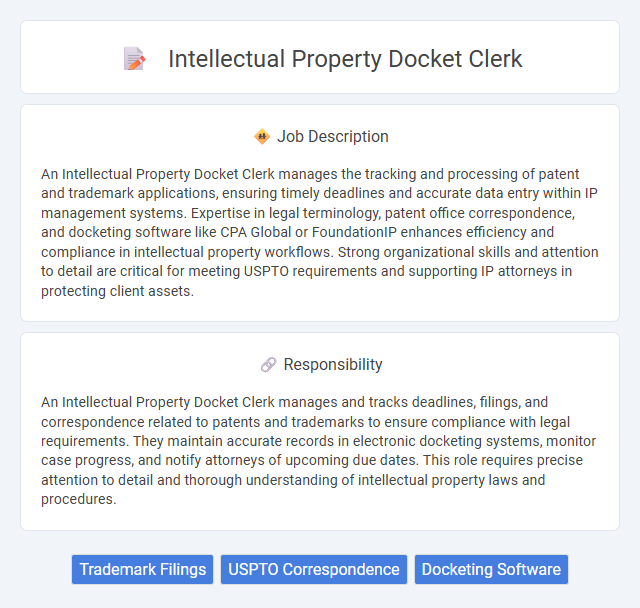
An Intellectual Property Docket Clerk manages the tracking and processing of patent and trademark applications, ensuring timely deadlines and accurate data entry within IP management systems. Expertise in legal terminology, patent office correspondence, and docketing software like CPA Global or FoundationIP enhances efficiency and compliance in intellectual property workflows. Strong organizational skills and attention to detail are critical for meeting USPTO requirements and supporting IP attorneys in protecting client assets.
Individuals with strong organizational skills and attention to detail will likely be well-suited for the Intellectual Property Docket Clerk role, which demands precise tracking and management of legal deadlines and documents. Those who prefer structured environments and routine tasks may find this position aligns with their strengths, while candidates seeking high levels of creativity or rapid task variation might not feel as comfortable. The role frequently requires interacting with intellectual property law professionals, so individuals with good communication abilities and patience stand a better chance of success.
Qualification
An Intellectual Property Docket Clerk requires strong organizational skills and attention to detail to manage patent and trademark application tracking efficiently. Proficiency in docketing software such as Foundation IP or CPA Global and familiarity with USPTO and global patent office procedures are essential. A background in paralegal studies, legal administration, or relevant experience in intellectual property law enhances job performance and eligibility.
Responsibility
An Intellectual Property Docket Clerk manages and tracks deadlines, filings, and correspondence related to patents and trademarks to ensure compliance with legal requirements. They maintain accurate records in electronic docketing systems, monitor case progress, and notify attorneys of upcoming due dates. This role requires precise attention to detail and thorough understanding of intellectual property laws and procedures.
Benefit
The role of an Intellectual Property Docket Clerk likely offers significant benefits such as enhanced organizational skills and in-depth knowledge of legal procedures related to patents and trademarks. This position probably provides valuable experience in managing critical deadlines and documentation, which can improve career prospects in intellectual property law or legal administration. Employees may also enjoy a structured work environment with opportunities for professional growth within law firms or corporate legal departments.
Challenge
The role of an Intellectual Property Docket Clerk likely presents challenges tied to managing complex case schedules and ensuring precise tracking of deadlines for patents and trademarks. Navigating intricate legal documents under strict time constraints may increase the probability of requiring keen attention to detail and exceptional organizational skills. Balancing high volumes of information could necessitate adaptability and the ability to prioritize tasks efficiently.
Career Advancement
An Intellectual Property Docket Clerk manages patent and trademark filings, ensuring deadlines and documentation accuracy critical to protecting client rights. Mastery of docketing software and understanding legal procedures can lead to promotions such as Senior Docket Clerk or Intellectual Property Paralegal. Gaining certifications like Certified Paralegal (CP) and specializing in IP law enhances prospects for roles in legal project management or IP portfolio analysis.
Key Terms
Trademark Filings
Intellectual Property Docket Clerks specializing in trademark filings manage and track the lifecycle of trademark applications, ensuring all deadlines and procedural requirements are met accurately. They maintain detailed records of submissions to the United States Patent and Trademark Office (USPTO), monitor status updates, and coordinate correspondence between clients and trademark attorneys. Proficiency in trademark law terminology and docketing software is essential for efficient handling of trademark portfolios and preventing missed critical deadlines.
USPTO Correspondence
An Intellectual Property Docket Clerk specializes in managing and organizing USPTO correspondence related to patent applications and trademark filings, ensuring accurate tracking of deadlines and legal documents. Proficient docket management supports timely responses to office actions, maintaining compliance with USPTO regulations and preventing application abandonment. Expertise in using specialized docketing software streamlines document processing and enhances overall patent prosecution workflow efficiency.
Docketing Software
An Intellectual Property Docket Clerk is responsible for managing and maintaining accurate records of patent and trademark deadlines using specialized docketing software such as CPA Global, Anaqua, or Foundation IP. This software ensures timely filing, renewals, and monitoring of intellectual property assets, reducing the risk of missed deadlines and legal complications. Proficiency in docketing tools improves workflow efficiency and supports legal teams in safeguarding intellectual property rights.
 kuljobs.com
kuljobs.com